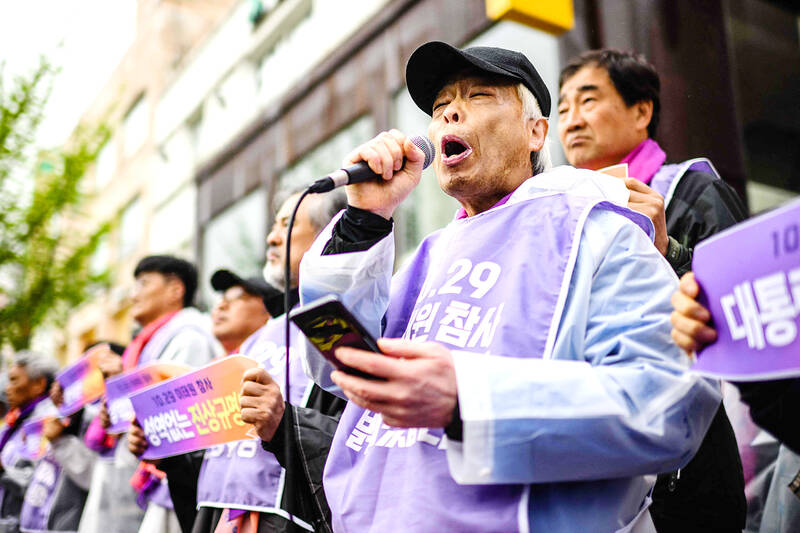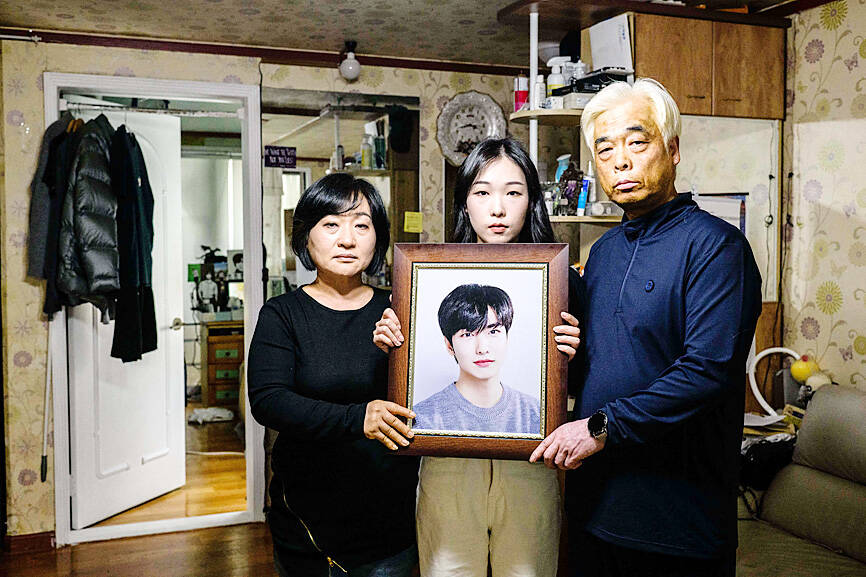First he lost his child in Seoul’s Halloween crowd crush. Then came a torrent of online abuse, upending his family’s once-private life and making him an Internet-wide figure of mockery.
In October last year, Lee Jong-chul’s 24-year-old son, Lee Ji-han, was among more than 150 people killed in the disaster in the city’s popular Itaewon district. Grief-stricken, he spoke to media, pleading with South Korean politicians to take action.
Then, as has happened after incidents from the Sandy Hook mass shooting to the disappearance of British woman Nicola Bulley, an Internet mob formed: the family’s personal tragedy was mocked, belittled and misrepresented online.

Photo: AFP
From photographs doctored to show Lee Jong-chul laughing after being offered compensation to attempts to link him to North Korea — two viral posts debunked by Agence France-Presse digital verification reporters — he and his family have become a virtual punching bag on Korean-language forums.
“It’s unspeakable what some of these comments say,” said his daughter, Lee Ga-young, adding that the sheer volume of abuse was “overwhelming,” with any news report on them attracting hundreds of comments, almost exclusively negative, in minutes.
At the family’s apartment in Goyang city just outside Seoul, Lee Ji-han’s bedroom has not been touched since he last walked out on Oct. 29. His clothes still hang on the door where he left them, the book he was reading lies on his bed.

Photo: AFP
“That day changed our lives forever,” his mother, Cho Mi-eun, said, adding that she still listens to old voicemail messages just to hear her son’s voice.
“Every night Ji-han’s father goes out to wait for him, for hours sometimes. He says he’s going out to smoke, but we know he’s waiting for Ji-han,” she said, adding that her husband had attempted suicide on multiple occasions since the disaster and the online attacks.
The families of the Itaewon victims want answers about why authorities failed to prevent the catastrophe, despite clear warning signs, said Lee Jung-min, who lost his 29-year-old daughter.
Some of the victims’ families formed a group “to understand what really happened and to hold those officials responsible,” said the bereaved father, who was visibly tired and unshaven.
However, the Internet interpreted their efforts to organize as an attack on the government, with right-wing trolls launching a coordinated counter-attack, accusing the families of being profiteers out for compensation, or anti-government forces.
Experts say the government is worried the disaster could hurt the administration. Seoul’s last conservative government lost power in part due to its mishandling of the 2014 Sewol ferry disaster, in which more than 300 people were killed.
As a result, some ruling-party lawmakers have criticized the victims’ families during parliamentary sessions.
Lawmakers have promoted outlandish conspiracies: One said that the crowd crush was caused by vegetable oil poured on the ground by opposition-linked labor union operatives, while another insinuated that the deaths were due to illegal drugs.
An official police investigation found no evidence of either claim, but South Korea’s highly polarized political environment allows such misinformation to thrive, said Seo Soo-min, a communications professor at Sogang University.
Two days after the disaster, Southe Korean Prime Minister Han Duk-soo urged people not to “make hateful comments, spread fabricated information or share graphic images of the accident.”
Yet the government has done almost nothing to stop the attacks, despite repeated pleas from victims’ families for help, said Kim Yu-jin, who lost her 24-year-old sister in the disaster.
A 16-year-old Itaewon survivor committed suicide in December last year, in part due to the online abuse, the victims’ families said.
Han said that the government bore no responsibility, blaming the victims for not being “strong minded” enough.
Even a public mourning altar set up to commemorate the victims has become a flashpoint after authorities threatened to remove it, and far-right YouTubers picketed it while live-streaming.
The victims’ families must now not only grieve their lost loved ones, but do battle for their memories online, Kim said.
Every day, she reads the fresh deluge of hateful comments about her sister and reaches out to individual media outlets to ask for them to be removed.
“I know it’s a hopeless task, there are countless comments, but I have to carry on,” she said. “Who else will fight for my sister?”

Former Nicaraguan president Violeta Chamorro, who brought peace to Nicaragua after years of war and was the first woman elected president in the Americas, died on Saturday at the age of 95, her family said. Chamorro, who ruled the poor Central American country from 1990 to 1997, “died in peace, surrounded by the affection and love of her children,” said a statement issued by her four children. As president, Chamorro ended a civil war that had raged for much of the 1980s as US-backed rebels known as the “Contras” fought the leftist Sandinista government. That conflict made Nicaragua one of

COMPETITION: The US and Russia make up about 90 percent of the world stockpile and are adding new versions, while China’s nuclear force is steadily rising, SIPRI said Most of the world’s nuclear-armed states continued to modernize their arsenals last year, setting the stage for a new nuclear arms race, the Stockholm International Peace Research Institute (SIPRI) said yesterday. Nuclear powers including the US and Russia — which account for about 90 percent of the world’s stockpile — had spent time last year “upgrading existing weapons and adding newer versions,” researchers said. Since the end of the Cold War, old warheads have generally been dismantled quicker than new ones have been deployed, resulting in a decrease in the overall number of warheads. However, SIPRI said that the trend was likely

BOMBARDMENT: Moscow sent more than 440 drones and 32 missiles, Volodymyr Zelenskiy said, in ‘one of the most terrifying strikes’ on the capital in recent months A nighttime Russian missile and drone bombardment of Ukraine killed at least 15 people and injured 116 while they slept in their homes, local officials said yesterday, with the main barrage centering on the capital, Kyiv. Kyiv City Military Administration head Tymur Tkachenko said 14 people were killed and 99 were injured as explosions echoed across the city for hours during the night. The bombardment demolished a nine-story residential building, destroying dozens of apartments. Emergency workers were at the scene to rescue people from under the rubble. Russia flung more than 440 drones and 32 missiles at Ukraine, Ukrainian President Volodymyr Zelenskiy

Indonesia’s Mount Lewotobi Laki-Laki yesterday erupted again with giant ash and smoke plumes after forcing evacuations of villages and flight cancelations, including to and from the resort island of Bali. Several eruptions sent ash up to 5km into the sky on Tuesday evening to yesterday afternoon. An eruption on Tuesday afternoon sent thick, gray clouds 10km into the sky that expanded into a mushroom-shaped ash cloud visible as much as 150km kilometers away. The eruption alert was raised on Tuesday to the highest level and the danger zone where people are recommended to leave was expanded to 8km from the crater. Officers also